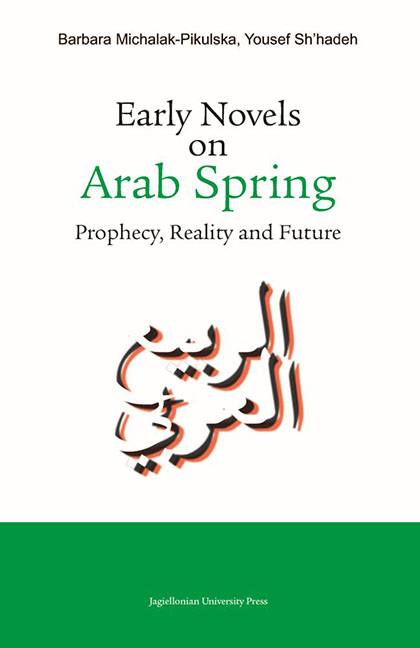Book contents
- Frontmatter
- Contents
- Introduction
- Part I Awakening of the Awareness of Subjugation – The Prophecy of the Spring of Nations in Arab Novels
- Part II At the Heart of the Arab Spring Events
- Part III The Future: The Spring Continues
- 17 Mu‘Taṣim Aš - Šā‘Ir : Uhzūǧat ar-raḥīl (A Song of Departure) and Fī intiẓār as-sulaḥfāt (Waiting for a Turtle)
- 18 Aḥmad ‘Abd Al - Malik : Al-Aqni‘a (Masks)
- 19 Ṭayba Aš - Šarīf Al - Idrīsī : Ḥaǧar min saqar (A Stone from Hell)
- 20 Amīra Aš - Širbīnī : ‘Itq (Liberation)
- 21 ‘ Izz Ad - Dīn Šukrī Fašīr : Bāb al-ẖurūǧ – risālat ‘Alī al-muf‘ama bi-bahǧa ġayr mutawaqqa‘a (The Gate to Leave – Ali’s Letter Filled with Unexpected Joy)
- Conclusion
- Bibliography
- Summary in Arabic
12 - Nūr ‘ Abd al - Maǧīd : Aḥlām mamnū‘a (Forbidden Dreams)
Published online by Cambridge University Press: 13 October 2023
- Frontmatter
- Contents
- Introduction
- Part I Awakening of the Awareness of Subjugation – The Prophecy of the Spring of Nations in Arab Novels
- Part II At the Heart of the Arab Spring Events
- Part III The Future: The Spring Continues
- 17 Mu‘Taṣim Aš - Šā‘Ir : Uhzūǧat ar-raḥīl (A Song of Departure) and Fī intiẓār as-sulaḥfāt (Waiting for a Turtle)
- 18 Aḥmad ‘Abd Al - Malik : Al-Aqni‘a (Masks)
- 19 Ṭayba Aš - Šarīf Al - Idrīsī : Ḥaǧar min saqar (A Stone from Hell)
- 20 Amīra Aš - Širbīnī : ‘Itq (Liberation)
- 21 ‘ Izz Ad - Dīn Šukrī Fašīr : Bāb al-ẖurūǧ – risālat ‘Alī al-muf‘ama bi-bahǧa ġayr mutawaqqa‘a (The Gate to Leave – Ali’s Letter Filled with Unexpected Joy)
- Conclusion
- Bibliography
- Summary in Arabic
Summary
The subject of power, revolution and devotion to the homeland is timeless in literature. Although revolutionaries in Egypt are full of enthusiasm, they will not be able to bring about reforms and create a new order in their homeland on January 25, 2011. Beside the fight for freedom and equality, there were also those for whom it was an opportunity for revenge and obtaining privileges. It is true that the revolution led to the collapse of the regime, but in this empty space nothing specific has yet been proposed that could reflect the desires and needs of all citizens. There are still those who want to use it for their own purposes and ambitions.
The novel Aḥlām mamnū‘a (Forbidden Dreams) depicts dramatic events that involve people from the poorest strata of Egyptian society, who dream of satisfying their hunger and of justice, and who want to interest the government in their difficult situation. It is poverty and the lack of prospects for a better future that are the main reason for the outbreak of the revolution on January 25, 2011. The Saudi writer depicts not only the dramatic fate of her heroes, but also the course of the Egyptian revolution on Tahrir Square.
At the beginning, the author presents the life story of Naǧiyya and her husband Ǧābir, who, because of impotence at such a young age, feels that he has lost his manhood. He feels stressed and has difficulty performing his professional duties. Although he has always been diligent and fulfilled his contracts on time, he is currently unable to complete the construction works that he has agreed to finish before a set date. To heal his shameful ailment, Ǧābir took pills, used herbs and even sought help from exorcists. All this did not bring any effect and his mental state gradually deteriorated. He became very nervous and stopped going to work. His friend, the developer Marzūq, persuaded him to return to work. However, Ǧābir worked thoughtlessly, which led to the fall of the scaffolding and his death.
The narrator talks about the dramatic situation in which Naǧiyya and her children: daughter – Widād, and son – Maḥmūd find themselves after the death of the sole breadwinner of the family.
- Type
- Chapter
- Information
- Early Novels on Arab SpringProphecy, Reality and Future, pp. 83 - 89Publisher: Jagiellonian University PressPrint publication year: 2022

